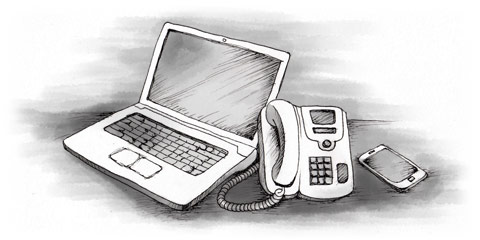When you order a telephone connection, you can take over the number of the previous tenant or get a new one. Although the use of landlines has dramatically decreased in the USA (more than one third of households now have wireless telephones, according to a survey from 2012), there are still many homes that have telephone points in almost every room, and if you need additional wiring you can get this from your phone company.
To have a telephone connected, contact your local telephone company (numbers are listed in telephone directories under ‘Customer Guide’ or ‘Consumer Guide’). Depending on the carrier, you may have to pay an installation fee. The time to install a new line varies from city to city and from carrier to carrier, but usually the process only takes a couple of days.
To order a phone line, you usually need to provide the following information:
- Your name
- Full address
- Name of the former occupant or previous phone number
- The type of calling plan you require
- The social security number of the person to be billed
- Credit information
- You choice of long-distance company
If you are a new customer and are unable to get credit, you might have to pay a deposit (usually one or two months estimated charges). The deposit earns interest and is repaid to you once the phone company sees that you regularly pay your bills.
Getting a telephone
Telephones can be bought from the phone company. If you intend to stay for a while, it will usually be cheaper to buy your own phone. You can find a good phone for less than $10 in major stores like Radio Shack or Best Buy or even at groceries and pharmacies.
Telephone bills
Your telephone bill will be sent on a monthly basis. It will detail charges for the previous month based on where you made calls to and how many minutes you talked for, detailing all your calls. If you choose a different company for your long-distance calls you might receive a separate bill or be billed through your local phone company for the long-distance calls as well.
You must pay your phone bill by the date it is due or you will be charged a late fee. If you don’t pay the bill the company will charge everything the next month as well as the fee. After that, they can disconnect your phone. To avoid this problem you can pay by direct debit and have the amount automatically debited from your bank account or your credit card. See our section on money transfers for further details.


